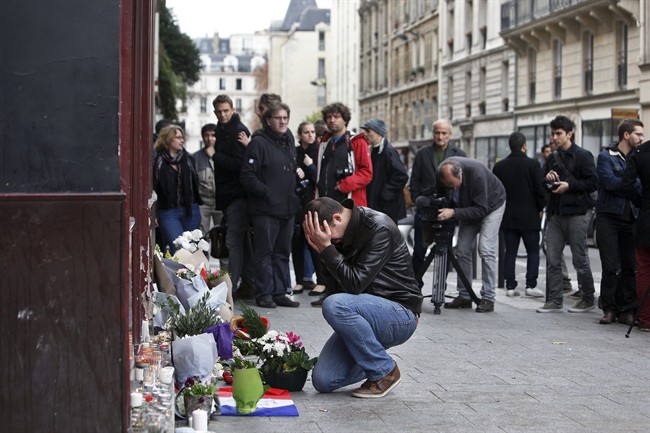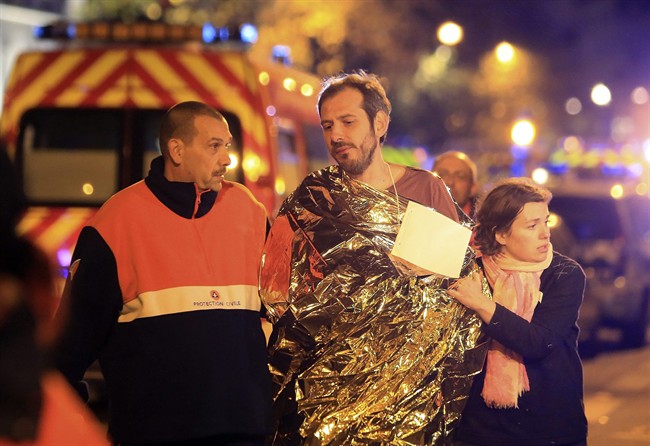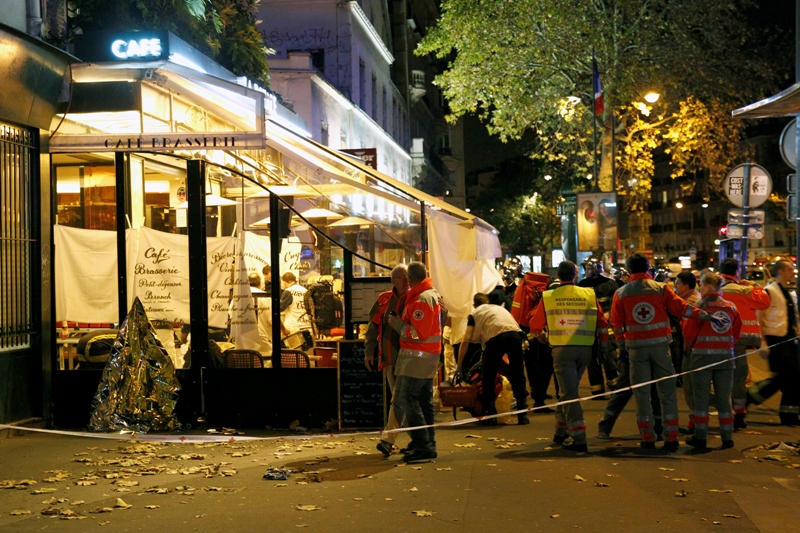WHAT WE KNOW SO FAR:

- ISIS has claimed responsibility for the six coordinated attacks in Paris
- Paris prosecutor Francois Molins says 129 people are dead, more than 350 people injured
- All attackers reportedly killed but police still looking for accomplices
- One bomber was French, another had a Syrian passport
- French President Francois Hollande has declared a state of emergency, military deployed.
French President Francois Hollande has vowed to strike back without mercy after the deadliest attack on French soil since the Second World War left at least 120 people dead in Paris Friday night.
Hollande blamed the carnage on what he called “a terrorist army, the Islamic State group, a jihadist army, against France, against the values that we defend everywhere in the world, against what we are: a free country that means something to the whole planet.”
- Mohamed Al-Fayed, whose son died with Princess Diana, accused of multiple rapes
- 12-year-old shoots, kills black bear attacking his dad in Wisconsin
- Hezbollah chief says Israel crossed ‘red lines’ with exploding device attacks
- Yellowstone Park tourist burns leg after going off trail near Old Faithful
Since then, the Islamic State has released an online statement claiming responsibility for the attack, saying eight militants armed with explosive belts and automatic weapons attacked carefully chosen targets in the “capital of adultery and vice.”
Speaking after an emergency security meeting early Saturday morning, Hollande declared three days of national mourning and raised the nation’s security to its highest level.
Micheal Cadot, the head of Paris police said Saturday that while all of the attackers are believed to have died, authorities are searching for possible accomplices. Authorities said eight died, seven in suicide bombings, a new terror tactic in France. Police said they shot and killed the other assailant.
One of the suicide bombers was of French descent, and another reportedly had a Syrian passport, French police officials told the Associated Press. So far, none of the attackers have been publicly identified.
Vigils for victims of the Paris attacks are cropping up all around the world. In Paris, mourners are leaving flowers, notes and tokens at the scenes of the attacks.
People are also flocking to French embassies in their home countries to express condolences.
In Germany, the flags on all government buildings were lowered to half mast.
State of Emergency leads to empty streets
The streets of Paris are nearly empty on Saturday as the city continues in a state of lockdown. Schools, libraries, department stores and other businesses have all locked their doors.
French authorities have also closed the Eiffel Tower, the Louvre Museum and other top tourist sites in Paris until further notice following deadly terror attacks.
When asked why no one is on the streets, a taxi driver in the city tells Global’s Mike Armstrong “No! We’re scared.”

Get breaking National news
Paris’s famous nightlife will also be affected with large scale concerts and events being cancelled; The rock band U2 has postponed its Saturday night concert in Paris in respect of the victims.

There are still more questions than answers about Friday’s trail of carnage which included series of attacks on at least two restaurants, a soccer stadium and a concert hall packed with music fans. But here’s what we know so far.
Shortly after 4 p.m. ET, reports began to trickle in of a shooting at a Paris restaurant.
Suzan Yucel, a Dutch journalist visiting Paris, and Agathe Moreaux, a Parisian student, were waiting across the street for their table at Le Petit Cambodge Friday evening when gunmen opened fire in the café, killing several people.
“We were having our beers outside and all of a sudden there were, like, fireworks, or maybe a shooting. So we all started running,” Yucel said.
“We didn’t know what was happening. Everyone was running and people were throwing their drinks away. Just running.”

Shortly after, two explosions went off at the Stade de France, a soccer stadium in Saint-Denis, just north of Paris, where France and Germany were playing a friendly match.
French President Francois Hollande was inside the soccer stadium at the time but was quickly escorted out by security.
During a televised address shortly afterward he declared a state of emergency and announced the country had closed its international borders.
“It is a horror,” he said.
And it continued to unfold throughout the night, amid reports of shootings elsewhere in the city and an attack at the Bataclan concert hall where over a hundred people were taken hostage, many of which were killed.
Those who survived the attack physically unscathed have been bused to a special crisis centre for psychological support.
Dozens of emergency workers and Red Cross workers in orange vests gathered in front of the building, the headquarters of Paris’ 11th arrondissement, or district. A few police officers in bullet-proof vests stood nearby.
By the early hours of Saturday morning, Paris time, French authorities confirmed at least 127 people dead, including multiple gunmen, and more than 200 people were injured, dozens critically.
The world reacts
Canadian Prime Minister Justin Trudeau said in a statement that he was “shocked and saddened that so many people have been killed.”
“Obviously our hearts and thoughts and prayers go out to our French cousins through this dark and terrible time,” he said during an evening address.
“These terrorist attacks are deeply worrying and obviously unsettling to people around the world. We have offered all of our help and support to the government of France and the people of France at this time.”
Trudeau was joined by a multitude of international leaders condemning the attacks and standing in solidarity with the victims of the Paris attacks.
“Paris itself represents the timeless values of human progress,” U.S. President Barack Obama said in a televised address.
“Those that think they can terrorize the people of France or the values they stand for are wrong.”
British Prime Minister David Cameron said his country “must be prepared for a number of British casualties” from the attacks.
He called the attacks “brutal and callous,” but didn’t raise the country’s terror threat level.
The attacks are prompting actions from foreign governments. Dutch Prime Minister Mark Rutte is boosting border controls; and Italy, Romania and Hungary have all announced stricter security measures. Russia’s civil aviation authority has also warned airports to be extra vigilant.
The Marseillaise and #PorteOuverte
As the Stade de France let out thousands of soccer fans in the wake of the attacks, video posted on Facebook captured a crowd of Parisians singing the Marseillaise – a marching song for French soldiers composed during the French Revolution.
And #PorteOuverte began trending on Twitter as Parisians opened their doors and offered their homes as safe havens for people seeking shelter.
The bloodshed scarred Parisians, as Global News reporter Carmen Chai and her friends found when their Friday night turned deadly.
We still don’t know who the attackers were and how Friday’s carnage was coordinated. But we’ll be chasing these and other answers in the hours and days to come.
For live breaking news and in-depth coverage, go to globalnews.ca.
IN PHOTOS: Images from the Paris attacks after shootings, explosions
Follow Global News’ live blog for the latest on the violent attacks in Paris.
With files from the Associated Press.































Comments